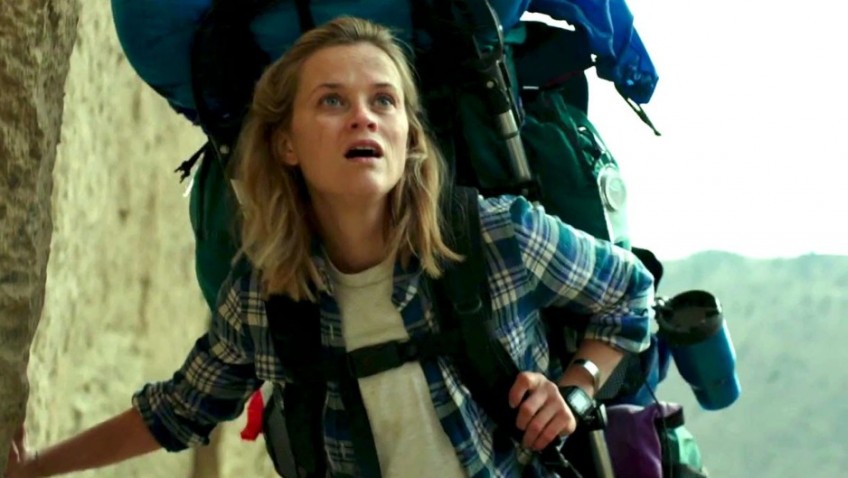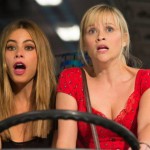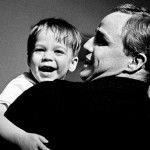Joyce Glasser reviews WILD (January 16, 2015) Cert 12, 115 mins.
Following Canadian director Jean-Marc Vallée’s Dallas Buyers’ Club, which Beat 12 Years a Slave to claim the Best Actor and Best Supporting Actor Academy Awards last year, the producer and star of Wild, Reese Witherspoon, bet on Vallée to give her a stab at a second Best Actress award. The bet paid off, as she was just nominated for Wild. Ironically, Witherspoon is perhaps the weak link in this well-made and entertaining film.
Based on the 2012 autobiographical memoir, Wild: From Lost to Found on the Pacific Crest Trail by Cheryl Strayed, Wild is a cross between Tracks (2014) and Into the Wild (2014) with a touch of 127 Hours (2010).
Tracks was based on the memoir of Robyn Davidson, a 27-year-old Australian woman who walked 1,700 miles across the Australian desert; while Sean Penn’s Into the Wild, also based on a true story and book, traced 24-year-old Christopher McCandless’s soul-searching travels across North America to the Alaskan wilderness.
Cheryl Strayed was also in her mid-twenties when she set about on her 1,100 mile walk up the Pacific Crest Trail to self-discovery. It is certainly not the masterpiece that is Into the Wild, Vallée, and scriptwriter Nick Hornby have delivered an absorbing “road movie” that continually confounds our expectations.
The film begins with a young woman in dirty hiking clothes on a ridge, losing her boot down the side of the mountain after reeling from pain when her toenail comes off. She stands up and howls before hurling the other uncomfortable boot down after the first.
Through a series of flash backs that run in parallel with the main wilderness action, we learn that the howl represents pain in her life that has built up since the death of her 45-year-old free-spirited single mother (Laura Dern, excellent).
Following her mother’s death, and estranged from her siblings, bright, well-read and educated Cheryl succumbs to a downward spiral of self-abuse. Through her dead-end waitress job she meets and sleeps with men indiscriminately and starts shooting heroin. At the age of 26, with her marriage destroyed and no job prospects, she starts life anew with a daunting physical challenge.
With no camping experience and armed only with guidebooks and an absurdly heavy back-pack, Cheryl sets out to walk the Pacific Crest Trail by herself. Whether it is another form of self-harming, a death wish, a prayer for redemption, or just what it takes to turn her life around, her determination and achievement are astonishing.
One of the joys of the film is travelling with Cheryl through breath-taking scenery and sharing her surprise various encounters. An attractive blond with a great figure, Cheryl receives special treatment, a fact that is not overlooked by a group of three male friends on the trail. Cheryl has also attracted attention and a kind of trail celebrity with her quotes from literary figures that she leaves in the Crest Trail logbooks along the way.
Perhaps the best scene in the film, and the most revealing encounter, comes early on, when Cheryl, starving from having packed the wrong kind of gas for her cooking equipment, asks a farmer for a lift to a restaurant.
Once in the obliging overweight man’s truck, we begin to share Cheryl’s growing apprehension about her safety when he invites her to dinner at his house. Without insisting on it, Vallée lets the outcome of this potential horror scenario play its course with cathartic results.
In many films that cut between past and present action the flashbacks eventually intrude on the main action. Vallée and Hornby attempt to give the strands equal strength and interest, but the flashbacks are often confusing to follow. When Dern is not in the picture, they become sketchy, too. What the filmmakers do not manage to do is track Cheryl’s spiritual healing or get into her mind in the way Penn did in Into the Wild.
Cheryl is a more experienced hiker at the end, of course, but the ending relies on voice-over to tell us that the healing process we have not experienced is complete.
Then there is Witherspoon, in every frame and conveying pain, hardship, joy and just about every emotion imaginable. As we have seen in Election, Walk the Line (for which she won an Oscar), Legally Blond and other films, Witherspoon is a very talented comic and straight actress. Perhaps, in part, because she is so familiar, there remains a mismatch here between the actress and the role.
It is difficult to associate Cheryl Strayed’s past or her mission with the person we see on screen. It is not just that Witherspoon is 38 playing a woman from ages 22 to 26, or that there are no signs of past heroin addiction (when did she cut the habit?). It is that she is too pretty, healthy, physically fit, and self-assured from start to finish.




